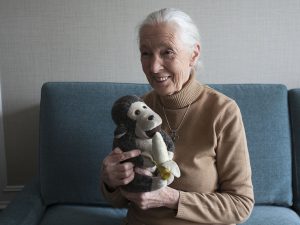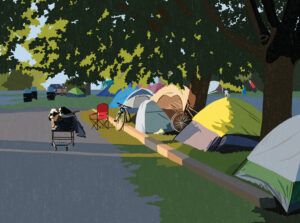
Environment
Clean commute
Canada's largest cities are paving the way for more eco-conscious commuting choices
- 3352 words
- 14 minutes
People & Culture
Canadian Geographic looks back on the life of the 2020 Royal Canadian Geographical Society recipient of the Lawrence J. Burpee Medal

Jan Morris was an individual whose words were rich with geography.
Throughout her long career as a distinguished journalist, essayist and historian, her work was ground-breaking: from her history-making reportage on the conquest of Mount Everest to the personal journey described in her 1974 autobiography Conundrum — which was one of the first autobiographies to record the journey of a personal gender transition. The Times chose it as one of “100 key books of our time.”
Morris was born in 1926 to an English mother and a Welsh father — while she grew up in England, it was Wales that always had a place in her heart. She was educated at the University of Oxford, at Christchurch College, and later served in the military as an intelligence officer in Italy and Palestine.
Morris was the only journalist that accompanied Edmund Hillary and Tenzing Norgay’s ascent of Everest in 1953. Morris climbed to base camp at 5,600 metres for the news from the summit and announced it to the world by sending a coded telegram down the mountain with a runner. It was an event that changed her life, launching her to world fame with her exclusive scoop.
Her life was likewise changed forever when, in 1972 in Casablanca, Morocco, she became one of the first high profile people to transition (although she later said that “I’ve never believed it to be quite as important as everyone made it out to be”).
“To me gender is not physical at all, but is altogether insubstantial,” she wrote in Conundrum. “It is soul, perhaps, it is talent, it is taste, it is environment, it is how one feels, it is light and shade, it is inner music, it is a spring in one’s stem or an exchange of glances, it is more truly life and love than any combination of genitals, ovaries and hormones.”
A beautiful writer, Morris’ travel essays were always imbued with a true sense of place and people — and she wrote on places ranging from Trieste and Venice to South Africa and North America. She wrote more than 40 books in all, being best known for her Pax Britannica trilogy on the history of the British empire. Her 1985 novel Last Letters from Hav was shortlisted for the Booker Prize for Fiction.
She had always been “somewhat obsessed” with Canada, she noted in an interview in the late 80’s. Her 1992 book O Canada: Travels in an Unknown Country was a deep exploration into Canada’s psyche through 10 vignettes of Canadian cities and towns.
“On the face of it Canada is one of the least magnetic places on earth,” she wrote. “Yet it is one of those two or three countries where half of humanity would prefer to reside. I can remember experiencing hardly a word of rudeness, or an inhospitable gesture, during the writing of these pieces, and this has only confirmed me in the conviction that Canada, while it may not be the most thrilling of countries, has a genuine claim to be considered the best.”
In 2020, the Royal Canadian Geographical Society was proud to award the Lawrence J. Burpee Medal to Jan Morris for her inspirational writing on a sense of place and contribution to our knowledge of human and physical geography.
Deeply saddened to learn of the passing of a legend, #JanMorris, after a long life of courage and adventure. It was a great honour to speak with Jan earlier this year to inform her that she had received the @RCGS_SGRC Burpee Medal, which she accepted with great modesty. @CanGeo
— John Geiger (@JohnGGeiger) November 20, 2020
Morris accepted honorary doctorates from the University of Wales and the University of Glamorgan, is an Honorary Fellow of Christ Church, Oxford, and a Fellow of the Royal Society of Literature. She was awarded a CBE, one of the highest-ranking Orders of the British Empire, in 1999. Ever modest, Morris accepted the honour “out of polite respect.”
Morris died at the age of 94 on November 20, which also marks the Transgender Day of Remembrance.
Through the many lives she lived, Jan Morris was always supported by her life partner Elizabeth. Morris asked to be buried on an island in the River Dwyfor, behind their Gwynedd home in Wales.
The epitaph for their shared headstone, written by Morris in English and Welsh, reads: “Here are two friends, at the end of one life.”
Are you passionate about Canadian geography?
You can support Canadian Geographic in 3 ways:

Environment
Canada's largest cities are paving the way for more eco-conscious commuting choices

People & Culture
The story of how a critically endangered Indigenous language can be saved

Environment
Jane Goodall sits with John Geiger, CEO of The Royal Canadian Geographical Society, to talk about her global efforts to protect the great apes, the environment and the human community.

People & Culture
For unhoused residents and those who help them, the pandemic was another wave in a rising tide of challenges